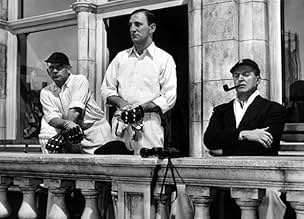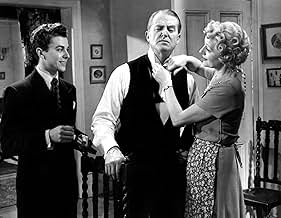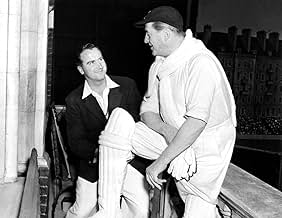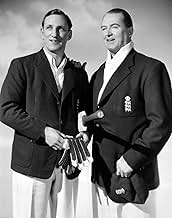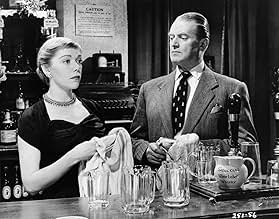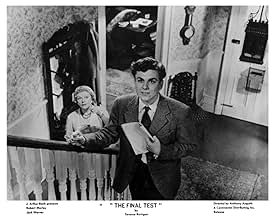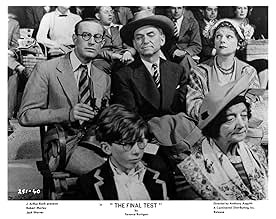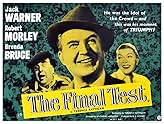Adicionar um enredo no seu idiomaSam Palmer is a cricketer about to play the final test match of his career. His schoolboy son Reggie is a budding poet who disappoints him by not attending the penultimate day's play. Unexpe... Ler tudoSam Palmer is a cricketer about to play the final test match of his career. His schoolboy son Reggie is a budding poet who disappoints him by not attending the penultimate day's play. Unexpectedly, Reggie is invited to the home of poet and writer Alexander Whitehead. Reggie fears... Ler tudoSam Palmer is a cricketer about to play the final test match of his career. His schoolboy son Reggie is a budding poet who disappoints him by not attending the penultimate day's play. Unexpectedly, Reggie is invited to the home of poet and writer Alexander Whitehead. Reggie fears he will also miss the final day--and therefore Sam's last innings--but it turns out that ... Ler tudo
- Self - Cricket commentary by
- (narração)
- Cricket Match Spectator
- (não creditado)
- Frank Weller
- (não creditado)
Avaliações em destaque
His son wriggles out of watching his fathers final match in order to visit his own hero a poet played by the wonderful Robert Morley.
It is a charming light comedy which deals with the father/son relationship. Morley steals the show, as expected and the ending is suitable happy.
The real tragedy is that this is practically the only film to feature cricket when dozens have been made about baseball. Cricket contains all the metaphor and allegories that exist about life and the universe. In fact it is itself a branch of philosophy which can teach humankind the true path to enlightenment. It is not just an interesting way to hit a ball with a stick!
This film should have been the thin end of a very large and wonderful wedge. John Boormans "Hope and Glory" contains an excellent cricket scene. If anyone can suggest any other films with a cricketing theme I would be pleased to hear from you.
Quickly filmed after being one of the earliest British TV plays by an established writer, "The Final Test" is a cheap and cheerful comedy. Documentary footage of real play at the Oval, South London, is hardly up to "Zelig" standards in melding into the studio shots. The film stocks do not match, and the crowd's rush into the ground is evidently back-projected. The setting is less grand than one associates with Rattigan. It is Cowardesque in the vein of "This Happy Breed", with a sauce bottle on the dinner table: the hero, Sam Palmer, is a professional batsman who has done well enough to give his son a fee-paying education. The only "posh" character besides Wattis is Robert Morley's pompous poet and playwright, whom the literary-minded son would rather visit than watch his dad play his last innings against the Australian tourists. Luckily Morley proves to be a cricket maniac and all ends well.
Jack Warner's remarkable, belated rise from fairly blue music hall comic and Maurice Chevalier impersonator to one of Britain's leading character actors is consolidated here. He can be humorous, gruff, judicious... and all in the same scene if required. There is no trace of the over-expressiveness of so many comedians trying to act. Though pushing 60, Warner looks no older than the real doyen of the English side, Cyril Washbrook, who along with a handful of colleagues nervously plays himself (no role is harder for a non-pro). The widowed Warner has a fancy for a barmaid at his local pub, the gaunt Brenda Bruce, and he has his own retirement dilemmas to resolve: should he marry a woman who may have a past, and should he take a job coaching boys at Eton when his son is about to go to Oxford and mingle with Etonians on level terms?
"The Final Test" therefore has a few gentle remarks to drop about changing social values and snobberies in post-war Britain. Sam's captain, Len Hutton, urges him not to fuss so much about the pecking order: an amusing way of using a real-life character, since the great Yorkshireman was England's first professional cricket captain and would soon be knighted. Morley's TV play "Following a Turtle to My Father's Tomb", which Sam's son watches in rapture and which drives Sam out to the pub, is a spoof of the middlebrow poetic drama (TS Eliot, Christopher Fry) then in vogue, which Rattigan did not admire. One line, "the great dome of discovery that men call the sky", takes off the exhibit of that name in the recent Festival of Britain.
The deserved rehabilitation of Rattigan, with the likes of David Mamet doing him homage, gives fresh interest to a script which takes the boulevard playsmith outside his usual range. No doubt the film technicians' union approved the democratic spirit, since this was one of its occasional efforts, via ACT Films, at keeping its members in work. Director "Puffin" Asquith, though the son of an earl and ex-prime minister, was a keen union activist. Sam Palmer was Jack Warner's last big film part for a decade. He was soon to resurrect his slain copper from "The Blue Lamp" and become TV's most famous PC in "Dixon of Dock Green."
Listed on IMDb as a 'comedy', I must admit that the words of one character rang true with me when she said of a TV play 'I thought you said this was a comedy well it probably gets more comedy later on'. However I quickly realized that the listing on this site was wrong and that this is not in any shape a comedy, even if it has vaguely amusing moments in it; rather it is a drama about a father and son relationship against the backdrop of cricket. The potential was there for a well-written piece with a good script delivering good characters with hurts, longings and differences between them, but it really doesn't get anywhere near doing that. If I told you that Sam is slightly stern and repressed about his son's disinterest in the sport that he loves then I have probably done a better job at informing you of their character than the script actually does during the whole 90 minutes. Aside from the obvious scenes of vague tension and argument the film never really does anything to actually get to the core of their relationship.
On top of this we also have some other issues put in as well such as those around the barmaid Cora and the other stuff around Whitehead; neither of these really hit the mark either and just give the film a rather aimless feel. With a lack of teeth to any part of the film, a few laughs could have done the world of good but it doesn't really have any of them either, with only some amusing aspects that don't really do anything of any merit. This is not to say it is bad, just distinctly average. As a sports film it is a non-event with very little actual cricket 'action' to speak of but I imagine many viewers will enjoy the very English conclusion to Sam's career, typically downbeat and warming.
The cast is OK but they don't have a great deal to work with. Warner is stiff and looks like he has emotions just below his surface but the script gives him no help with this at all and his efforts are wasted with it. Jackson is an annoying little twerp and he does nothing to really make me interested in him or his character in the least. Bruce doesn't have a clue what she is supposed to be doing and it shows. Allen is OK, as are Maxted and a few others in support roles. Given a colourful character, Morley brings some much needed life to the film and steals all his scenes.
Overall this is an average film that is more notable for its missed opportunities rather than what it actually does well. Despite the nicely downbeat conclusion the film is pretty average and unmemorable, failing to deliver characters, a script or any real sense of emotional involvement.
This is a gentle comedy with a touch of drama. If you want to see how comedy works (and you understand cricket) watch the first 5 minutes. Senator Stanley Maxted arrives in England and makes his way to the Oval where he poses a few questions to deadpan Richard Wattis. The questions are standard cricketing enquiries (you mean they play for 5 days and it might still be a draw?) which could be cheesy but the delivery and Wattis' "matter of fact" responses make you laugh.
Sam's cricketing prowess does not extend to his son who is more interested in poetry and this forms the backbone of the movie – does the son care enough about dad to watch his final innings? At the same time, does dad care enough about his son to appreciate his interests.
Sam not only gives the umpire a lift to the ground but entertains him for dinner the night before (they wouldn't allow it these days you know). Sam also pops down to the local for a drink around closing time during the middle of the game - but he only drinks lemonade so that's alright then. Robert Morley (wearing a rather fetching jump suit) spices up the last third of the film as a vain, muddled poet.
Você sabia?
- CuriosidadesIn the opening scene, shot in London Waterloo railway station, the film of the locomotive arriving at the platform is flipped left-to-right, as revealed by the mirror-reversed number on the side of the locomotive cab. This was most likely intentional, so that in the next shot the platform is on the same side of the train.
- Erros de gravaçãoAt the end of the first day of England's innings it is said that they scored 320. The next day on the radio, John Arlott says 283.
- Citações
Reggie Palmer: I'm afraid I don't awfully like cricket.
Alexander Whitehead: Don't you really? I have heard of such people.
- ConexõesRemade as The Final Test (1961)
Principais escolhas
Detalhes
- Data de lançamento
- País de origem
- Idioma
- Também conhecido como
- Poslednja provera
- Locações de filme
- Pinewood Studios, Iver Heath, Buckinghamshire, Inglaterra, Reino Unido(studio: made at Pinewood Studios, England)
- Empresas de produção
- Consulte mais créditos da empresa na IMDbPro
- Tempo de duração
- 1 h 30 min(90 min)
- Cor
- Proporção
- 1.37 : 1

